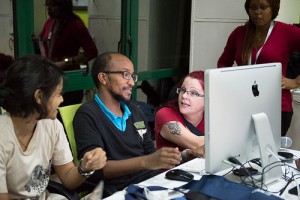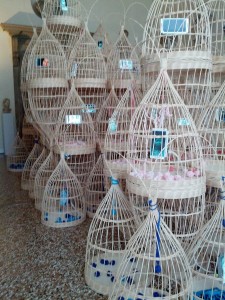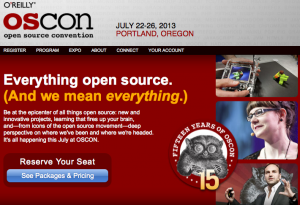Protest and Crisismapping are intertwined with voice. I think conflict mappers, videographers, data analysts and storytellers are incredibility brave and important to our future. But, local knowledge, local language and local context must guide decisions. There are some tough questions to ask about what should be openly shared or why not have something as open data?
Videos, imagery layers, pictures, reports, maps, stories and datasets are used to both give voice and collect evidence on human rights violations. From the comfort of my home in Canada, I have not lived in times of civil war in Syria. I have not stood in the freezing cold in Kyiv alongside protestors. We can, in solidarity, write about it, share links online, become crisismappers (Digital Humanitarians), petition our governments, but for the most part, we are a world away. No matter how connected we are via the Internet, we can be equally disconnected.
On Protest
At Info Activism Camp, I joined the protest salon. Speakers discussed their activism in various global contexts. You can download and watch the discussion, read the protest mini-magazine and listen to the protest soundtrack.
There is a big difference in marching down to Queens Park (Toronto) vs. trying to feed your friends in Taksim Square in Istanbul or keeping your friends safe in Brasil. The stories of people’s lives, their efforts to protect rights and collect evidence gave me a profound backdrop for how I observe the world. The videos and livestreams from Ukraine tell a story of another country’s people in protest. There have been over 3 million views for the video I am a Ukrainian. The first time I watched it I cried. On the second view, it hit me how powerful video and Internet remains. Then and now: I fear for their safety.
Crisismapping Syria
Talking with Brown Moses, Women Under Siege Syria, or Syria Tracker, I have come to learn about the tenacity of humans and potential of digital forensics. These projects and their leaders are the forefront of asking questions: what should be published or not published. Their verification methods for video, pictures and reports are mapping new ground. They work very closely with people in the affected regions alongside global helpers. Brown Moses is meticulous in his analysis of social media (how Facebook is destroying History), weaponery and videos. Lauren Wolfe has built the Women Under Siege project to give voice to women who suffer brutal violence in times of war. Her methods in research, journalism, online engagement and verification highlight how a map can be one corner of a larger, more extensive project. Both the Syria Tracker and Women Under Siege teams do not publish all the details outright. They review, debate, curate and anonymize. Brown Moses has a unique talent of identifying and teaching methodology. These digital skills show us how crisismapping has evolved. Evidence and data collection happens in real-time. People are using these tools to make decisions. This is the nature of data and information. And while data can and has been used as a commodity and a power device, these types of projects show focus on those we serve – the survivors and the affected.
From Aleppo
“We struggle with this challenge, balancing between the imperative to do no harm with the virtues of transparency and openness.”
All of us seek information for evidence or even to help guide humanitarian decisions. This week First Mile Geo released it’s detailed case study on Aleppo complete with a set of open data. Collecting data about bakeries, locations and, potentially, movements in a conflict zone and then releasing that data will surely bring on questions. But, the First Mile Geo is already asking them with us:
Matt McNabb: But the principles underlying open data have their limits in conflict-affected areas, where the contest of information can –and often does –emerge more frequently to support actions that may have a deleterious effect on citizens’ safety or well being. Perhaps obvious to say, data in war can be a dangerous thing.
I firmly believe that the next future of open data is collected by citizens for whom the data is about rather than only stored in a government or business sanctioned data portal. We need both. The success or failure of Open Data will happen in the “majority world” (or as others call it the Global South or Developing world.) It is great to have Open Data events in over 110 places around the world on Open Data Day. One day is a start, but I think the penetration of Open Data will only happen if it follows the lead of OpenStreetMap. People need to be involved at a local level. Simply put: people don’t trust government and want to be part of the process (have agency over their data.) So, it is with this that I think methodology of First Mile Geo is at the forefront of combining offline community engagement (paper and pen) tied with maps to build local help. Crisismapping shows us that the raw questions alive in the field and being shared openly by folks like the First Mile team, Brown Moses, Syria Tracker and Women Under Seige. We need to consider what they have learned and how it can apply in conflict, crisis or developing areas.
Also see the Wired article on Mapping Aleppo
****
And now for more questions:
What does it mean to be “open” and “collaborative” in a conflict or crisis zone? What does it mean for protestors? When does the affected population get a voice in what video/picture or imagery gets used and for what means? What are the new ethics for the digital crisis? In January of this year, I joined a round table and said: we need an imagery code of conduct (for satellites and drones). I advised them that we can’t wait for 4 years of research. This is happening now. People are being affected now and digital humanitarians are having these discussions now. I shared some of the example discussions we have had within the Humanitarian OpenStreetMap Team. As security analyst Bruce Schneier rightfully points out, location is being used and we need to prepare for the new level of privacy and security discussions. While we race to share, collaborative and open up information, we need to build stronger data guidelines and data training.
Please go to: RightsCon and Responsible Data Forum to talk among peers. I’ll be watching via the Internet trying to catch snippets.

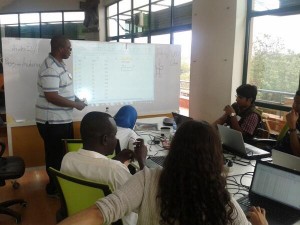
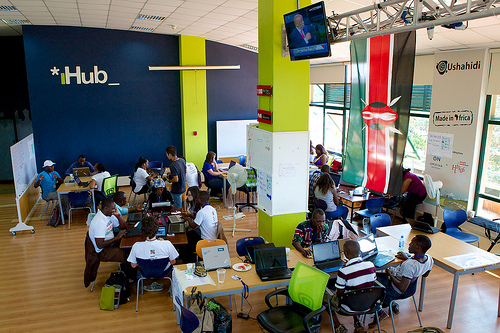 (Photo by Ushahidi)
(Photo by Ushahidi)